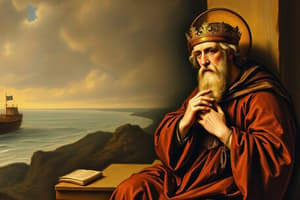Podcast
Questions and Answers
Who was considered as the 'give of life' in the Christian philosophy?
Who was considered as the 'give of life' in the Christian philosophy?
God
What is the name of the book written by Irenaeus that explains God as the giver of life?
What is the name of the book written by Irenaeus that explains God as the giver of life?
Adversus Haereses
Which of the following events led to Saint Augustine's conversion to Christianity?
Which of the following events led to Saint Augustine's conversion to Christianity?
- A profound mystical experience
- Reading the works of Saint Ambrose (correct)
- A vision of Jesus
- A pilgrimage to Rome
What is the name of the book written by Saint Augustine that discusses his conversion experience?
What is the name of the book written by Saint Augustine that discusses his conversion experience?
Which of the following philosophy did Saint Justin Martyr initially follow before converting to Christianity?
Which of the following philosophy did Saint Justin Martyr initially follow before converting to Christianity?
According to Justin Martyr, the ______ is the principle of order and knowledge.
According to Justin Martyr, the ______ is the principle of order and knowledge.
Saint Justin Martyr believed that the human being is made up of two parts: the body and the soul.
Saint Justin Martyr believed that the human being is made up of two parts: the body and the soul.
What is the name of the era in Church History when the 'Fathers of the Church' emerged?
What is the name of the era in Church History when the 'Fathers of the Church' emerged?
The 'Fathers of the Church' were exclusively saints.
The 'Fathers of the Church' were exclusively saints.
What is the name of the philosophical concept which refers to the ultimate good or end goal in Greek philosophy?
What is the name of the philosophical concept which refers to the ultimate good or end goal in Greek philosophy?
Who is considered as the primary source of Christian theology?
Who is considered as the primary source of Christian theology?
Saint Augustine of Hippo believed that human beings are saved only by their own works.
Saint Augustine of Hippo believed that human beings are saved only by their own works.
According to Saint Irenaeus, what is the ultimate purpose of human life?
According to Saint Irenaeus, what is the ultimate purpose of human life?
What is the term used by Saint Augustine to describe the ultimate good or the state of fullness?
What is the term used by Saint Augustine to describe the ultimate good or the state of fullness?
Flashcards
Patristic Period
Patristic Period
The period in Church history when the Fathers of the Church taught and wrote.
Fathers of the Church
Fathers of the Church
Influential Christian teachers in the first eight centuries of the Church, using logic and reason to understand religious truths.
Saint Augustine
Saint Augustine
A key Patristic philosopher who defended free will and God's grace, addressing Pelagianism and original sin.
Saint Augustine's Summum Bonum
Saint Augustine's Summum Bonum
Signup and view all the flashcards
Saint Augustine's concept of sin
Saint Augustine's concept of sin
Signup and view all the flashcards
Saint Justin Martyr
Saint Justin Martyr
Signup and view all the flashcards
Logos Spermatikos
Logos Spermatikos
Signup and view all the flashcards
Saint Irenaeus
Saint Irenaeus
Signup and view all the flashcards
Study Notes
Philosophers and Understanding God
- Through history, many thinkers explored humanity's understanding of God.
- Philosophers used reason to understand God and humanity's connection with the divine.
The Patristic Period
- The Patristic Period focused on the "Fathers of the Church."
- These were influential Christian teachers who used logic and reason.
- This period covered the first eight centuries of the Church.
- Important figures included saints like Ignatius of Antioch, Athanasius, and Cyril of Alexandria, and others like Tertullian and Origen.
- They are considered the most significant teachers of faith in the Church.
Saint Augustine of Hippo (354-430)
- Augustine had a sinful life, then a conversion by Saint Ambrose.
- He defended human free will against Pelagianism.
- He explained God's grace and original sin.
- He believed reason could aid in understanding God.
- Augustine wrote "Confessions."
- He sought the ultimate good (summum bonum), finding it in God.
- He described sin as a state of separation from God (remoteness).
- He believed the ultimate goal was merging with God.
Studying That Suits You
Use AI to generate personalized quizzes and flashcards to suit your learning preferences.




